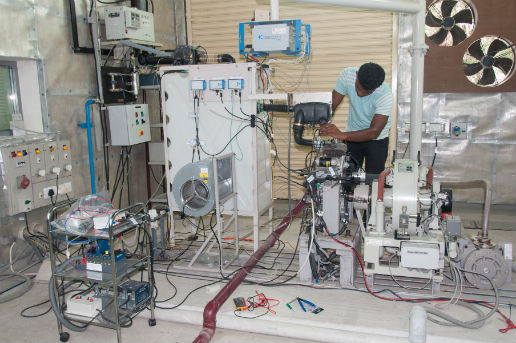IIT Madras to host the World’s Largest Combustion Research Centre
Chennai: Indian Institute of Technology Madras is going to host the world’s largest Combustion Research Centre. It will address the twin challenges of Alternative Energy and Environmental Protection afflicting a modern emerging economy such as India by focussing on effective utilization of combustion as a means of thermo-chemical energy conversion.
The National Centre for Combustion Research and Development (NCCRD), scheduled to be inaugurated on 13th October 2017, is supported by Science and Engineering Research Board, Dept. of Science and Technology (DST), Government of India. A similar centre has also been established at Indian Institute of Science, Bangalore (IISc).
With over 30 faculty members from Six Departments of IIT Madras working on this project, this is the largest grouping of academic combustion researchers globally. In addition, the infrastructure facilities are also the largest for any combustion research centre in an academic setting globally. The NCCRD has been established at a total cost of Rs. 90 crore. It will develop state-of-the-art capabilities in combustion research involving experts in the country.
Speaking about importance of NCCRD, Prof. Satyanarayanan Chakravarthy, Professor In-charge, NCCRD, IIT Madras said, “The emphasis at NCCRD is to work on the industry-relevant problems of the future in close collaboration with organisations in application sectors of automotive, Aerospace, thermal power, process industry and fire protection.”
The research interests are in 3 major application sectors: Automotive, Thermal Power, and Aerospace Propulsion, besides fire research and microgravity combustion to minor extent. The goals of the NCCRD are:
(i) Providing state-of-the-art facilities for Research,
(ii) Creating knowledge network among other institutional combustion researchers,
(iii) Manpower development at the master’s and PhD levels,
(iv) Industry collaboration,
(v) Continuing education for young industry professionals and academics, and
(vi) Addressing grand challenge topics of practical importance
Speaking about his experience working with NCCRD, Mr. Sundar Krishnaswami, Consulting Engineer, GE Aviation, said, “GE Aviation Technology team has been working with NCCRD on a couple of projects. This partnership helps us tap into their state-of-the-art experimental facilities, optical diagnostic equipment, and talent pool of the Institution. The collaboration has helped us gain valuable insights that further advance GE’s technology and thought leadership in low emission combustion technology for gas turbines.”
The NCCRD is located in a five-storey building at IIT Madras Campus which also hosts separate smaller structures for propellant combustion, fire research, and air storage. Many industrial and R&D organizations are working closely with the NCCRD. They include Mahindra, TVS, AVL, GAIL, GE, Shell, BHEL, DRDO (DRDL, GTRE, CFEES), NAL, ISRO, Forbes-Marshall, Siemens, Thermax, Cummins, FM Global, Tata Power, VTT and Valmet.
The NCCRD pursues grand challenges:
(i) High-efficiency IC engine technologies such as Gasoline direct injection,
(ii) Flame Stability in High-speed Combustion involving sub-topics such as for low emissions and mitigating combustion instability in gas turbines, and improved fuel-air mixing in supersonic combustors,
(iii) Clean coal technologies such as high-ash coal gasification
Ahead of the inauguration, the NCCRD is also organizing a one-day workshop at IIT Madras on Thursday, 12th October 2017, focusing on Automotive Combustion.
It aims to update participants about the Automotive Research Facilities available within NCCRD at IIT Madras and IISc Bangalore, Summarize current research activities conducted at NCCRD and deliverables achieved and its impact. The participants will also be briefed on the procedures for using the facilities at NCCRD and its benefits to other academic institutions, R&D labs and Industry

